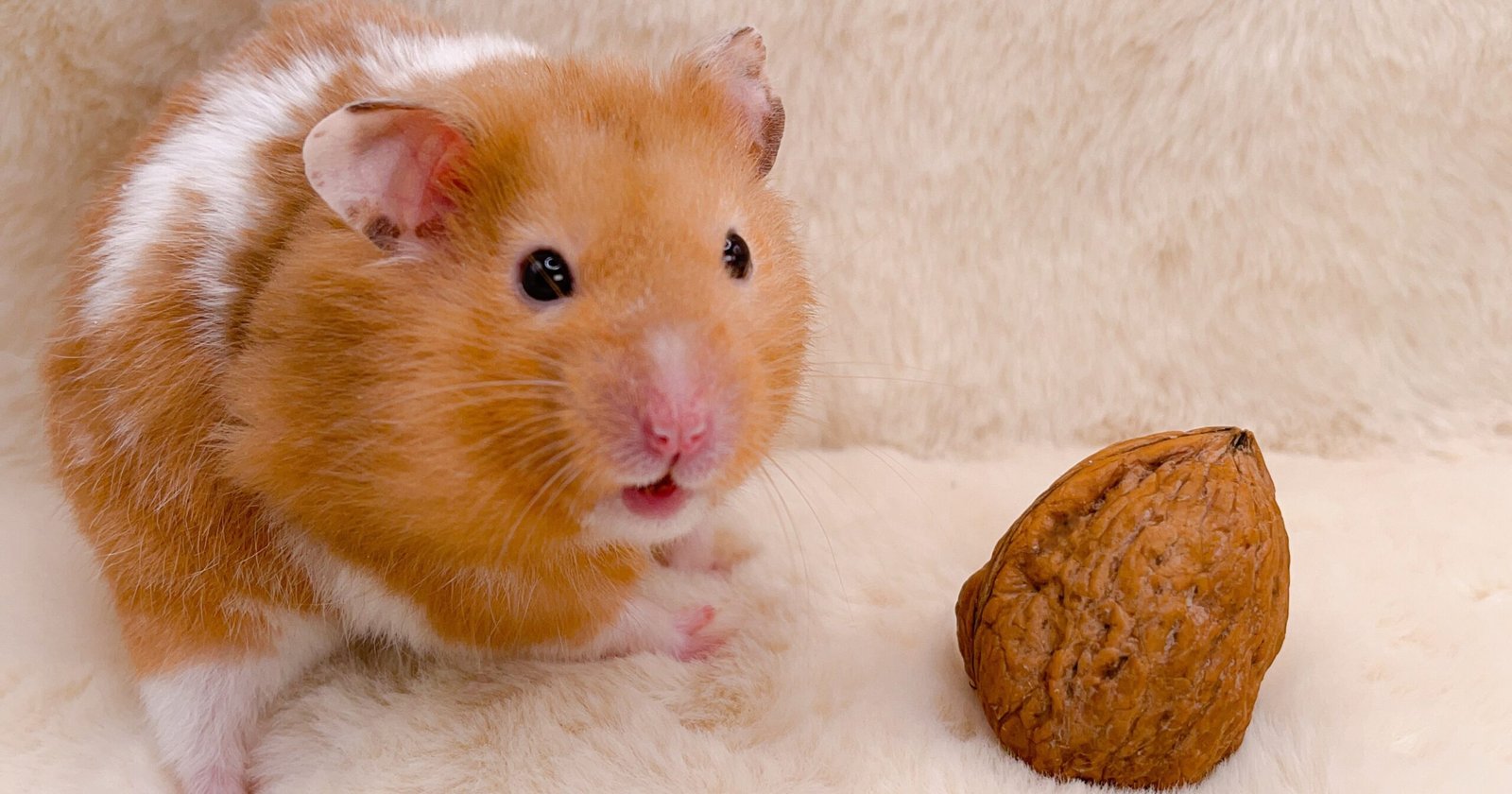Hamsters can consume a variety of nuts, such as walnuts, almonds, and peanuts. It’s important to offer these nuts unsalted and unseasoned, and in moderation, to avoid issues like obesity and digestive problems.
Are you a proud hamster owner wondering about the nutritional benefits of walnuts for your tiny companion? Well, you’ve come to the right place! In this blog post, we’ll explore the question, “Can Hamster Eat Walnut?”
Hamsters are adorable creatures with specific dietary needs, and it’s essential to ensure they get the right balance of nutrients. As we uncover the suitability of walnuts for hamsters, we’ll consider their size, preferences, and overall well-being. In this blog post, we will discuss, “Can hamsters eat walnuts,” so you can keep your furry friend happy and healthy.
Are Walnuts Good For Hamsters?
Are walnuts good for hamsters? In moderation, yes.
While walnuts provide beneficial nutrients like healthy fats and proteins, it’s important to offer them as an occasional treat.
However, hamsters are small creatures, and too many nuts may lead to obesity or digestive issues.
So, it’s wise to offer walnuts as an occasional treat rather than a daily snack.
So, the question “Can Hamster Eat Walnut?” is met with a cautious nod.
Remember, balance is crucial.
Providing a well-rounded diet and offering walnuts as a periodic delight ensures your hamster stays content and healthy.

The Nutritional Benefits Of Walnuts For Happy Hamsters
Hamsters are small, lovable pets that deserve the best care, including a balanced diet. When it comes to treats, you might wonder about the goodness of walnuts for your furry friend.
In this guide, we’ll explore the key nutritional information of walnuts for hamsters.
Protein Powerhouse
Walnuts are a protein-packed snack, providing your hamster with the energy it needs for its playful antics.
Protein helps in muscle development, keeping your furry friend active.
Including walnuts in moderation ensures your hamster gets the protein punch it deserves.
Healthy Fats
Walnuts are rich in omega-3 fatty acids, contributing to heart health and promoting a lustrous fur coat.
Adding a few walnuts to your hamster’s diet now and then can enhance its overall wellness.
Nutrient Variety
Walnuts aren’t just about protein and healthy fats; they also pack a punch of essential vitamins and minerals.
From vitamin E for skin health to manganese for bone development, walnuts offer a mini multivitamin package for your hamster.
This variety ensures your furry friend gets a well-rounded nutritional boost.
Fiber Friend
Maintaining a healthy digestive system is crucial for hamsters, and walnuts come to the rescue with their fiber content.
Fiber promotes proper digestion and helps prevent constipation.
Including walnuts in your hamster’s diet can contribute to a happy and healthy tummy.
Moderation Matters
While walnuts bring a host of nutritional benefits, it’s vital to offer them in moderation. Hamsters are small creatures, and too many walnuts may lead to issues like obesity or digestive discomfort.
As a responsible hamster owner, ensuring a balanced diet with the occasional walnut treat strikes the right nutrition.

Risks of Feeding Walnuts to Your Hamster
Before indulging your hamster in walnut treats, it’s crucial to be aware of potential risks. Let’s explore five important considerations to ensure your furry friend’s well-being.
Choking Hazard
One significant risk of feeding walnuts to your hamster is the potential for choking. Hamsters are small creatures, and the size of walnuts may pose a choking hazard.
It’s crucial to either break the nuts into smaller, manageable pieces or offer alternatives to ensure your furry friend’s safety.
Obesity Concerns
Overfeeding may lead to excessive calorie intake, contributing to obesity in hamsters. Maintaining a proper balance and offering walnuts as an occasional treat helps prevent the risk of obesity and keeps your hamster in good shape.
Digestive Dilemmas
Walnuts contain fiber, which is generally good for digestion.
However, offering too many walnuts might lead to digestive issues in hamsters.
It’s essential to monitor your pet’s reaction to walnut consumption and adjust accordingly, ensuring a happy and trouble-free digestive system.
Allergic Reactions
Just like humans, hamsters can have allergies.
Introducing a new food, such as walnuts, may trigger allergic reactions.
Watch for signs like itching, swelling, or changes in behavior.
If you notice any unusual reactions, consult with a vet and consider eliminating walnuts from your hamster’s diet.
Imbalanced Diet
Hamsters need a diverse range of foods to meet all their nutritional requirements. Feeding walnuts exclusively may lead to deficiencies in other essential nutrients.
Ensure a varied diet to promote optimal health for your furry companion.

Tips for Feeding Your Hamster Walnuts Safely
Feeding your hamster walnuts can be a delightful experience, but it requires care.
Here are ten easy tips to ensure your furry friend enjoys these treats safely and happily.
- Break into Bite-sized Bits: Prevent choking by breaking walnuts into smaller pieces.
- Moderation is Key: Offer walnuts as an occasional treat to avoid excess calories and potential weight issues.
- Watch for Allergies: Monitor for any signs of allergic reactions and consult a vet if needed.
- Variety Matters: Don’t rely solely on walnuts; ensure a diverse diet for balanced nutrition.
- Freshness Check: Provide fresh walnuts and discard any that seem stale or moldy.
- Hydrate Your Hamster: Always offer fresh water alongside walnut treats to keep your hamster hydrated.
- Observe Digestive Health: Be mindful of your hamster’s digestion; if issues arise, adjust the walnut quantity.
- Store Them Right: Keep walnuts in a cool, dry place to maintain their quality and nutritional value.
- Introduce Gradually: When introducing walnuts, start with a small amount to gauge your hamster’s response.
- Consult the Vet: If in doubt or if your hamster has health concerns, seek advice from a
Conclusion
When pondering, “Can Hamster Eat Walnut” Yes, but the key lies in balance and mindfulness. While walnuts can be a tasty and nutritious addition to your hamster’s diet, it’s crucial to proceed with caution. Ensure the nuts are offered in small, manageable pieces to prevent choking hazards and be mindful of the potential risks of obesity and digestive discomfort due to their caloric and fiber content. Introduce walnuts gradually and monitor for any signs of allergies or adverse reactions. By practicing moderation and keeping a keen eye on your furry friend’s well-being, you can indeed let your hamster enjoy the goodness of walnuts as a delightful treat.
FAQs
Can hamsters eat walnuts?
Hamsters can eat walnuts in moderation as a tasty and nutritious treat. Ensure to remove the shell and break the nut into small pieces to prevent choking hazards.
Can hamsters eat the walnut shell?
No, hamsters cannot eat the walnut shell. The hard shell can be difficult for them to digest and might cause harm to their tiny tummies. Always make sure to remove the shell before offering walnuts to your hamster.
Are there alternatives to walnuts for hamster treats?
Yes, consider other hamster-friendly treats like sunflower seeds, pumpkin seeds, or small pieces of fruit. Always introduce new treats gradually to monitor your hamster’s reaction.
Can hamsters eat different types of walnuts, like black walnuts?
Stick to common walnuts available in stores. While some hamsters may enjoy different varieties, others might find them too strong or bitter. Introduce new types cautiously and monitor your hamster’s response.
Can baby hamsters eat walnuts?
It’s better to wait until they’re fully grown before introducing walnuts. Young hamsters have specific dietary needs, and nuts may be too rich for them.

